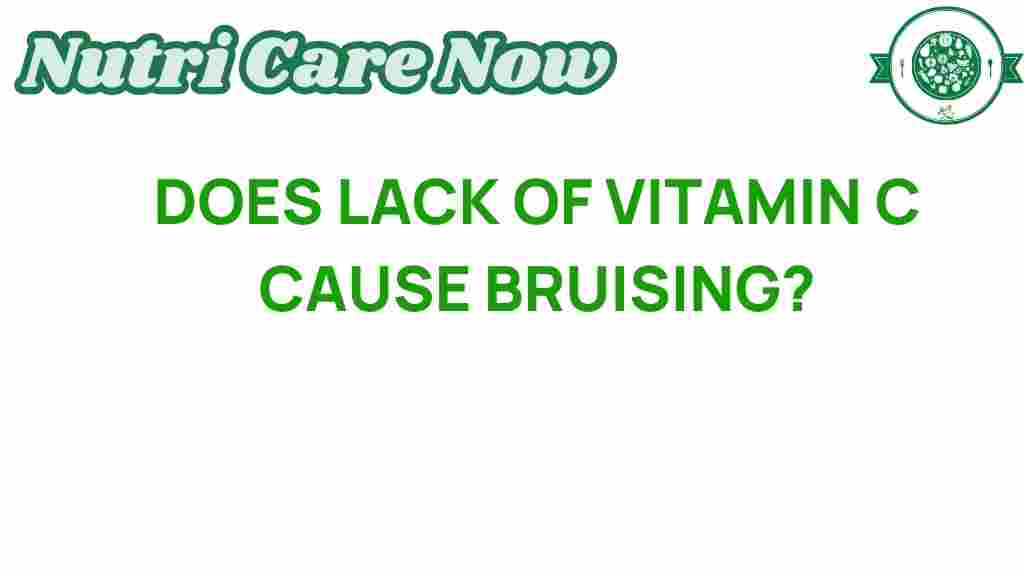Unraveling the Mystery: Does Vitamin C Deficiency Lead to Bruising?
Vitamin C is a crucial nutrient that plays a significant role in maintaining overall health and wellness. Known for its antioxidant properties and its importance in collagen synthesis, vitamin C deficiency can lead to various health issues, including an increased tendency to bruise. This article will explore how vitamin C deficiency affects bruising, the symptoms associated with it, and ways to ensure you are getting enough of this vital vitamin in your diet.
Understanding Vitamin C and Its Role in the Body
Vitamin C, also known as ascorbic acid, is a water-soluble vitamin that is vital for numerous bodily functions. It acts as an antioxidant, helping to protect cells from damage caused by free radicals. Additionally, vitamin C is essential for:
- Boosting the immune system
- Enhancing iron absorption
- Promoting healthy skin and tissue repair
- Supporting cardiovascular health
Given its critical roles, it is essential to maintain adequate levels of vitamin C through nutrition.
What is Bruising and Why Does It Occur?
Bruising, medically termed ecchymosis, occurs when small blood vessels break, causing blood to leak into the surrounding tissues. This can result from various factors, including:
- Injury or trauma
- Medications (such as blood thinners)
- Genetic disorders affecting blood vessels
- Vitamin deficiencies, particularly vitamin C
Bruises typically appear as marked discolorations on the skin, ranging from shades of red, purple, blue, and yellow as they heal. Understanding the connection between vitamin C and bruising is essential in identifying potential deficiencies.
Symptoms of Vitamin C Deficiency
A deficiency in vitamin C can manifest in various symptoms beyond just increased bruising. Common signs include:
- Fatigue and weakness
- Dry, scaly skin
- Gum disease or bleeding gums
- Joint pain and swelling
- Frequent infections or illnesses
- Slow wound healing
If you notice these symptoms, it may indicate a deficiency in vitamin C that requires attention. The link between vitamin C and bruising is particularly noteworthy since bruising may be one of the more visible signs of this deficiency.
How Does Vitamin C Deficiency Lead to Bruising?
Vitamin C plays a crucial role in collagen production, a protein that helps maintain the integrity and elasticity of blood vessels. When there is a deficiency of vitamin C:
- Collagen synthesis is impaired, weakening blood vessels.
- Capillaries become more fragile, making them more susceptible to breaking.
- The body struggles to repair damaged tissues efficiently.
As a result, individuals with vitamin C deficiency may experience bruising more easily than those with adequate levels of this vitamin.
How to Address Vitamin C Deficiency
To combat vitamin C deficiency and reduce the risk of bruising, consider the following steps:
1. Evaluate Your Diet
Start by assessing your current nutrition. Ensure your diet includes a variety of vitamin C-rich foods, such as:
- Citrus fruits (oranges, lemons, grapefruits)
- Bell peppers
- Strawberries
- Kiwi
- Broccoli
- Tomatoes
- Leafy greens (spinach, kale)
2. Consider Supplements
If dietary changes are insufficient, or if you have dietary restrictions, vitamin C supplements may be beneficial. Consult with a healthcare provider to determine the appropriate dosage.
3. Monitor Symptoms
Keep an eye on any symptoms of deficiency. If you notice an increase in bruising or other related issues, it may be time to reassess your vitamin C intake.
Troubleshooting Vitamin C Deficiency
If you suspect that you are experiencing vitamin C deficiency, here are some troubleshooting tips:
- Consult a Healthcare Professional: Speak with your doctor or a registered dietitian for personalized advice and possible testing.
- Keep a Food Diary: Track your intake of vitamin C-rich foods to identify gaps in your diet.
- Consider Underlying Conditions: Certain medical conditions, such as gastrointestinal disorders, can affect nutrient absorption.
- Stay Informed: Educate yourself about the recommended dietary allowance (RDA) for vitamin C, which varies by age, gender, and life stage.
Additional Nutrients for Skin Health and Bruising
While vitamin C is key, other nutrients also play a role in skin health and bruising prevention:
- Vitamin K: Important for blood clotting and may help reduce the appearance of bruises.
- Iron: Essential for hemoglobin production; low iron levels can lead to increased bruising.
- Vitamin E: Acts as an antioxidant and helps protect skin cells.
- Zinc: Supports skin repair and immune function.
Incorporating a variety of nutrients can enhance overall wellness and help prevent bruising.
Maintaining Optimal Vitamin C Levels
To ensure you maintain optimal vitamin C levels and promote overall health and wellness, consider these tips:
- Incorporate vitamin C-rich foods into every meal.
- Choose fresh, whole foods over processed options, which may lack essential nutrients.
- Cook vegetables lightly to preserve vitamin C content, as it is sensitive to heat.
- Stay hydrated, as water is essential for nutrient absorption and overall health.
Conclusion
In conclusion, vitamin C deficiency can indeed lead to increased bruising, along with a host of other health issues. By understanding the symptoms associated with deficiency and the vital role that vitamin C plays in our bodies, we can take proactive steps to ensure we are meeting our nutritional needs. Regularly incorporating vitamin C-rich foods into your diet, considering supplements if necessary, and monitoring your health can significantly enhance your wellness. Remember, a well-balanced diet is key to maintaining healthy skin and preventing bruising.
For more information on vitamins and nutrition, check out this comprehensive guide.
To learn more about the importance of vitamins for skin health, visit this resource.
This article is in the category Health and created by NutriCareNow Team
